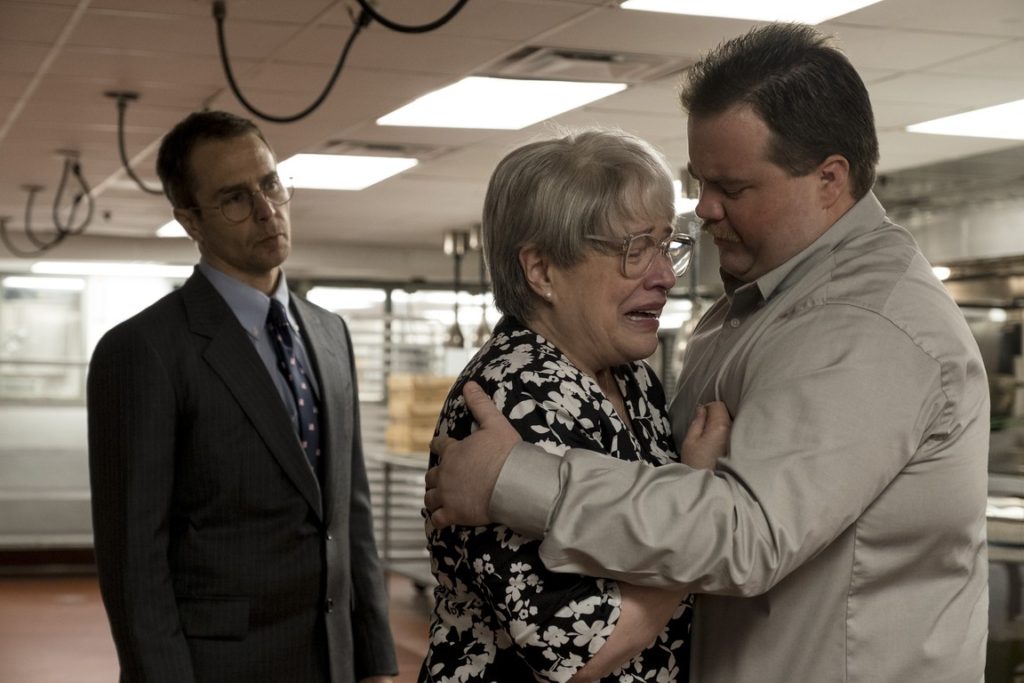DECEMBER 19, 2019
At the end of every movie year, Clint Eastwood seems to sweep in at the last minute with some under-the-radar film to try his hand at the Oscars. Sometimes it works — he won Best Picture in 2004 for his last-minute entry “Million Dollar Baby” — and sometimes it doesn’t, such as last year’s money-making critical misfire “The Mule.”
True to form, the 89 year-old Eastwood is back late this year with another entry, the biopic “Richard Jewell,” which focuses on the security guard who spotted a bomb-laden backpack at the 1996 Atlanta Olympic Games and moved people away from the bomb, possibly saving hundreds of lives. He was acclaimed as a hero, but then a strange thing happened — the authorities began looking at Jewell instead as the possible bomber.
Jewell’s reputation was dragged through the mud until the real bomber, terrorist Eric Robert Rudolph (who would later bomb two abortion clinics and a lesbian nightclub), was discovered to be the real Atlanta bomber. By that time, for Jewell, his exoneration came too late — his life was essentially ruined by the false accusation, and he died in 2007 at the age of 44.
Eastwood and screenwriter Billy Ray take an empathetic view of Jewell, which is helped no end by a terrific lead performance by character actor Paul Walter Hauser in the title role. Hauser’s take on Richard is a smart one — he portrays the security guard as the grown-up version of that drunk-with-power hall monitor we all had a grammar school. You know the type — the cop wannabe who loves the trappings of the job, such as twirling his nightstick, but on the surface hasn’t a clue about the courageousness needed to be an effective police officer. That is, in Richard’s case, he is forced to be courageous.
Screenwriter Ray follows the lead of his politically-conservative director by laying the blame for the accusation against Richard, whether rightly or wrongly, first at the feet of the FBI, personified by composite FBI Agent Tom Shaw (Jon Hamm) and his partner Agent Dan Bennet (Ian Gomez), desperate to find a culprit somewhere, as they try to coerce the naive Richard into compromising himself and confess to the bombing.
The second culprit in the Ray script is the media, and that is where “Richard Jewell” has really run into trouble. The Atlanta-Journal Constitution has threatened to sue Warner Brothers for the film’s depiction of its reporter Kathy Scruggs (Olivia Wilde), whom the film claimed used the lure of sex with Agent Shaw to get the dirt on Richard for what turned out to be a false story. Scruggs is deceased and cannot defend herself. Wilde, a director herself (her film “Booksmart” is a far better one than “Richard Jewell”), has been basically left hanging out to dry by her colleagues — Ray has said little to defend the characterization and Eastwood has said nothing in her defense.
As there is no evidence that Scruggs ever traded sex for a scoop, she is ironically being as unfairly smeared here as Richard was in 1996. It’s a shame, not only for her family and friends, but also to a lesser degree for the film itself, because the controversy has almost completely buried the qualities of “Richard Jewell.” Hauser is a talent who has been finally been given the chance to shine, and he makes the most of it in a wonderfully complex performance as Richard. Kathy Bates, as Richard’s mother Bobi, has the most Oscar-baity role, featuring lots of “my son is innocent” crying, but Bates is professional enough to dial it back just enough so that she’s never over the top. And it’s great to see Sam Rockwell as Richard’s lawyer Watson Bryant playing a role where he doesn’t have to portray a racist.
Eastwood is a terrific director, but one thing he is not is a stylist. He’s a head-down, tell-the-story and move-on-to-the-next project kind of director, and “Richard Jewell” reflects that ethic. Little flair, no flourishes, just storytelling, and that’s just fine.
It’s just a shame that the controversy over the depiction of Kathy Scruggs here seems to have overtaken the fact that Jewell was never charged and was totally exonerated of all suspicion. He even received a formal apology from Attorney General Janet Reno, a fact that is never brought up in the film.
It’s too bad, since “Richard Jewell” should have been about heroism and injustice but is instead becoming fodder for the right to criticize media ethics. Richard Jewell the man deserved better than this.
GRADE: B-












